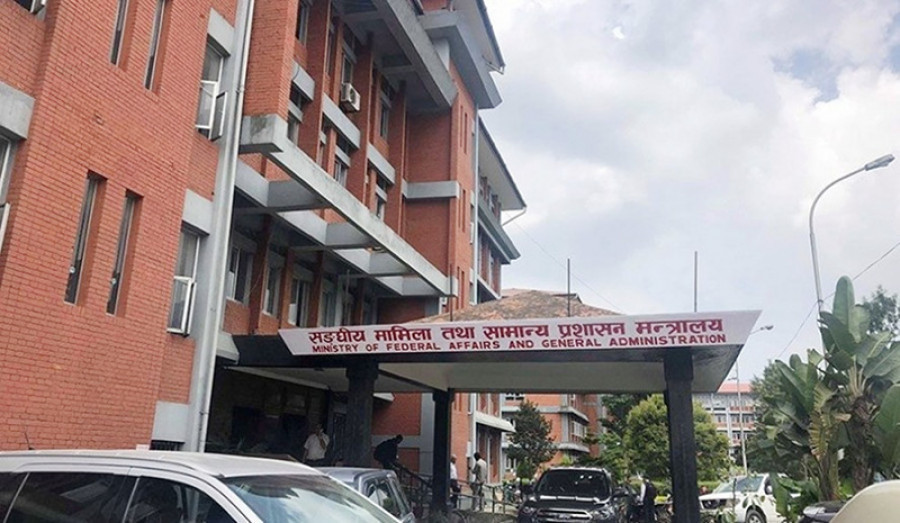National
Civil servants withdraw protest after deal with government
Government assures protesters the Federal Civil Service Bill will be tabled in the current session of Parliament that starts on Sunday.
Post Report
Civil servants have called off their protest following the government’s assurance to prioritise the passage of the Federal Civil Service Bill which aims to address their concerns.
A meeting of the government delegates and representatives of the civil servants on Thursday evening reached an agreement that the proposed bill will be tabled in the upcoming session of Parliament.
The team led by Deputy Prime Minister and Minister for Defence Purna Bahadur Khadka and including Minister for Finance Prakash Sharan Mahat and Minister for Federal Affairs and General Administration Aman Lal Modi, besides secretaries from several ministries, had heard the concerns of the protesters.
The civil servants had started fresh protests following a delay in the passage of the Federal Civil Service Act necessary to guide the recruitment, promotion and deployment of the government employees. Presenting a 21-point charter of demands, they had given until Monday to address their concerns.
“We found the government positive towards our demands. All the protest programmes have been withdrawn following the assurance to get the bill approved in the upcoming parliamentary session, addressing our concerns,” Gopal Prasad Pokharel, chairperson of the Nepal Civil Service Employees' Union, told the Post. “The bill will be given a final shape with our consent.”
The new session of federal parliament commences on Sunday. Although the federal government had registered the Federal Civil Service Bill at the Parliament Secretariat in February 2019, the tenure of the House of Representatives expired before the bill got through Parliament. The bill had a provision for 80 percent of the vacant seats for the officer positions to be filled through open competition, allocating 20 percent for departmental promotions. It also envisioned to cap 40 years as the maximum age for inservice employees to compete for higher positions.
The civil servants are against both positions. They have been demanding 50 percent reservation for the inservice staff at the officer level and are also against an age limit to compete for higher positions.
They also want a level-based hierarchy instead of one based on class. The government currently follows a dual system in civil service. Against the proposal to have a single official trade union, the civil servants want liberty to open trade unions in any number, citing the constitutional right of citizens to form associations.
“The government dialogue panel agreed to address all our concerns,” said Pokharel. “Let’s see how the bill looks once it gets the final shape.”
In the absence of a law, provinces have largely been unable to recruit new staff.
Madhesh Province had introduced its own civil service law but some of its provisions are inconsistent with the Civil Service Act-1993. For instance, the Act fixes the retirement age for civil servants at 58 years but the provincial government has extended the limit to 60 years. The Constitution of Nepal says the provincial laws that are inconsistent with the federal laws will become void. This is the reason why the provincial government hasn't been able to implement the legislation.
The provincial governments too had reservations over some of the provisions in the bill. They stood against the provisions to deploy the chief executive officer at the local units from the federal government.
They also demanded that the provinces should have the authority to deploy ministerial secretaries against the provisions of the bill that the federal government will be doing the job.
The provincial governments want only the principal secretaries to be deployed by the federal government.




 8.54°C Kathmandu
8.54°C Kathmandu














